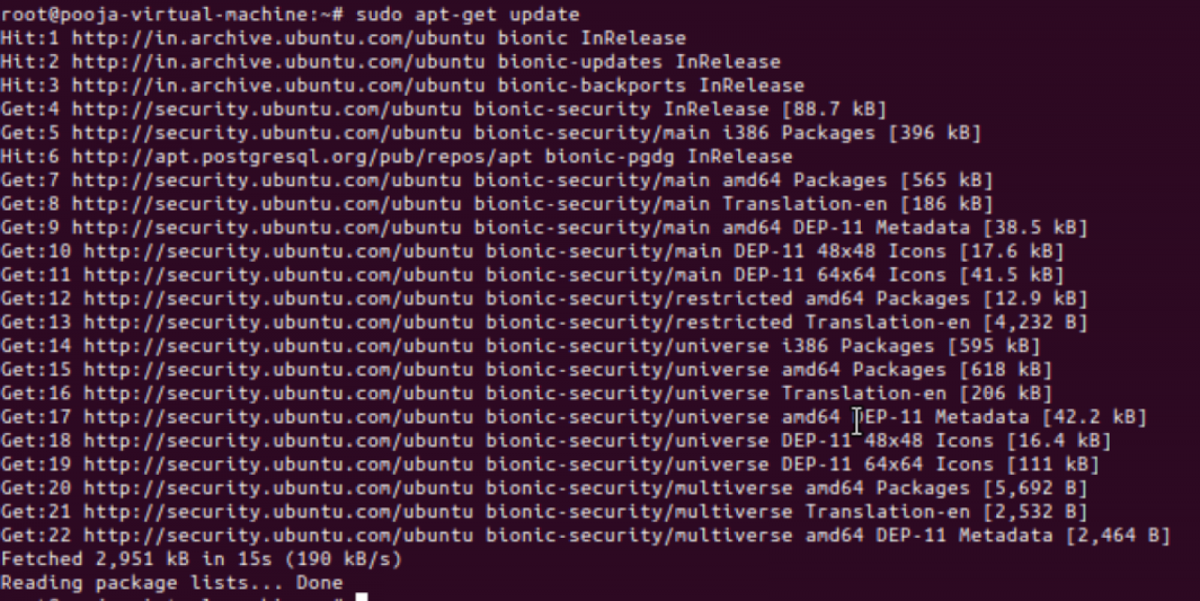What Is The Registered Srevice Forpostres In Linux
SUMMARY: This commodity covers how to install PostgreSQL on Ubuntu Server for Linux. It goes over iv steps for installation:
1. Enable the PostgreSQL apt repository
two. Install PostgreSQL on Ubuntu
iii. Connect to PostgreSQL
four. Log in to the cluster
Here, we are going to expect at how to install PostgreSQL on Ubuntu Server.
This post volition help you with installing the PostgreSQL database server on your Ubuntu 18.04, Ubuntu 16.04 and Ubuntu 14.04 systems.
Stride 1 – Enable the PostgreSQL apt repository
PostgreSQL packages are bachelor in the default Ubuntu repository, just other versions of PostgreSQL are besides available through the PostgreSQL apt repository.
To use the apt repository according to Ubuntu version, follow these steps:
one. Visit the PostgreSQL Ubuntu download site:
https://www.postgresql.org/download/linux/ubuntu/
two. Select your version of Ubuntu and re-create the corresponding line for the apt repository.
For Example:
For Ubuntu xviii.04 you should select Bionic (18.04):
deb http://apt.postgresql.org/pub/repos/apt/ bionic-pgdg main
three. Create the file "/etc/apt/sources.listing.d/pgdg.list" and add together the corresponding line for the repository in it:
root@pooja-virtual-machine:~# sudo sh -c 'echo "deb http://apt.postgresql.org/pub/repos/apt/ bionic-pgdg chief" >> /etc/apt/sources.list.d/pgdg.listing' 4. Import the repository signing key and update the parcel lists:
root@pooja-virtual-motorcar:~# wget --serenity -O - https://www.postgresql.org/media/keys/ACCC4CF8.asc | sudo apt-fundamental add - Step 2 – Install PostgreSQL on Ubuntu
Nosotros accept added the PostgreSQL official repository to our system, now we need to update the repository list:
root@pooja-virtual-machine:~# sudo apt-become update 
To install PostgreSQL on Ubuntu, use the apt-get (or other apt-driving) control:
root@pooja-virtual-motorcar:~# apt-get install postgresql-eleven Step 3 – Connect to PostgreSQL
During PostgreSQL installation, by default, it creates a user "postgres" and also creates a system account (Operating Organization User) with the same name "postgres."
Then to connect to the PostgreSQL server, log in to your organization equally user "postgres."
root@pooja-virtual-auto:~# su - postgres Step iv – Log in to the cluster
On Ubuntu, the cluster is initialized during the installation. You can invoke the below control to find the condition of the running PostgreSQL cluster:
root@pooja-virtual-machine:~# ps -ef | grep postgres postgres 4862 ane 0 05:32 ? 00:00:00 /usr/lib/postgresql/xi/bin/postgres -D /var/lib/postgresql/eleven/main -c config_file=/etc/postgresql/11/main/postgresql.conf postgres 4864 4862 0 05:32 ? 00:00:00 postgres: 11/chief: checkpointer postgres 4865 4862 0 05:32 ? 00:00:00 postgres: 11/main: background writer postgres 4866 4862 0 05:32 ? 00:00:00 postgres: xi/main: walwriter postgres 4867 4862 0 05:32 ? 00:00:00 postgres: xi/main: autovacuum launcher postgres 4868 4862 0 05:32 ? 00:00:00 postgres: xi/main: stats collector postgres 4869 4862 0 05:32 ? 00:00:00 postgres: 11/chief: logical replication launcher Now yous can log in to the PostgreSQL cluster and query through the psql customer:
postgres@pooja-virtual-car:~$ /usr/lib/postgresql/11/bin/psql -p 5432 psql (eleven.5 (Ubuntu 11.v-3.pgdg18.04+1)) Type "help" for help. postgres=# \l Listing of databases Proper noun | Owner | Encoding | Collate | Ctype | Access privileges -----------+----------+----------+---------+-------+----------------------- postgres | postgres | UTF8 | en_IN | en_IN | template0 | postgres | UTF8 | en_IN | en_IN | =c/postgres + | | | | | postgres=CTc/postgres template1 | postgres | UTF8 | en_IN | en_IN | =c/postgres + | | | | | postgres=CTc/postgres (3 rows) Your PostgreSQL installation has been completed successfully.
Reference link for PostgreSQL 11.5 docs:
https://www.postgresql.org/docs/11/index.html
Source: https://www.enterprisedb.com/postgres-tutorials/how-install-postgres-ubuntu
Posted by: dunbarthoice.blogspot.com


0 Response to "What Is The Registered Srevice Forpostres In Linux"
Post a Comment